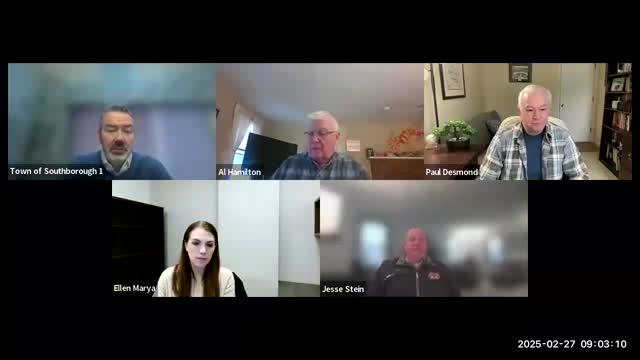Southborough trust seeks CPC transfer to allow quick property acquisitions, outlines housing‑plan work
Get AI-powered insights, summaries, and transcripts
Subscribe
Summary
The Town of Southborough Affordable Housing Trust discussed asking the Community Preservation Committee to transfer the balance in the CPC housing account so the trust can act quickly on property acquisitions, and reviewed the housing production plan and financing options.
The Town of Southborough Affordable Housing Trust discussed asking the Community Preservation Committee (CPC) to transfer the balance in the CPC housing account — described in the meeting as “in excess of half a million dollars” — to give the trust liquidity to pursue quick acquisitions of existing single‑family homes or condominium units for affordable housing.
Members said CPC members expressed appreciation for the trust’s mission statement but asked for more specificity about how money would be spent; trust members said they can provide higher‑level scenarios (for example: “a property becomes available and we need to move quickly”) while keeping transaction details in executive session.
Why it matters: Trust members said the funds would allow the trust to act faster on property opportunities than a once‑a‑year town meeting transfer would permit, especially for acquisitions that often require swift offers. Members also discussed the town’s housing production plan and Safe Harbor status under state rules, and explored financing tools — including bonding — to expand the trust’s buying power.
At the start of the discussion, Ellen (Trust member) said, “The CPC definitely expressed appreciation for the additional detail that was sent over, in the mission statements,” and added that some CPC members still wanted “more shape” about short‑term uses of funds. Al (chair) suggested the trust could describe typical scenarios without revealing confidential executive‑session details: “...we have been looking at single family homes typically and with the intent of buying and probably renovating and then either renting or reselling on an affordable basis.”
Trust members agreed to attend the CPC meeting scheduled that evening to present responses to CPC questions. Several members proposed an ongoing briefing relationship with the CPC so the committee would be comfortable approving transfers in future years; speakers emphasized that any transfer and spending must comply with Community Preservation Act (CPA) rules and with the trust’s own authorities.
Property examples and acquisition mechanics: Members cited past property efforts to illustrate likely targets. Al referenced a past effort to buy a house on South Oaks Road (the trust said it had been outbid) and said the trust tends to focus on older, smaller single‑family homes that are more affordable to acquire. The Atwood property (town‑owned) was discussed as an example that would require a town‑meeting vote if the trust pursued it because it is currently held by the town; Al noted the town is also addressing lead contamination on a portion of that site.
The trustees discussed a condominium at 12 Blueberry Lane in a 55+ community as an example of a potential acquisition. Al said the unit carries a $450 monthly homeowners association fee and asked staff to check how HOA fees affect permanent affordability; the trust agreed to research comparable municipal programs for preserving condominium units as affordable inventory.
Financing, bonding and scale: Paul and other members raised the possibility of combining the trust’s capital with borrowing to stretch funds further. Brian Ballantyne, identified in the meeting as the town treasurer, was mentioned as the person who could explain bonding mechanics; trust members asked staff to invite him to a future meeting. One participant explained how previous Chestnut Hill land borrowing was structured and said annual CPA payments can be used to service general‑obligation debt that supports acquisitions.
Housing production plan and Safe Harbor: Trust members said they must update the town’s housing production plan by late June and that Karina/Corina (town staff mentioned in the discussion) would circulate prior RFPs and a list of consultants. Jesse and another member reported they had checked the town’s Safe Harbor status tied to a 40B project at 120 Turnpike; speakers said the town is currently in Safe Harbor based on that project but is “apparently 1 unit shy of meeting our 10% goal,” and noted that a building permit deadline (discussed in the meeting as 12/17/2025) applies to an aspect of that timeline. Trust members agreed to move quickly on the RFP for a housing‑plan consultant and to ask the state for any short extension if needed.
Process and limits: Members repeatedly noted the interplay between CPA rules, the trust’s mission statement and the trust’s own legal authority. As Ellen said, “there are different requirements and restrictions on what the CPA housing funds can be used for versus what the trust can spend money on.” Trustees described standard due diligence steps for acquisitions — inspections, title review and environmental checks — and said they would not move forward on properties with unresolved environmental or title issues.
Votes at a glance - Approval of minutes, Feb. 12, 2025 (public minutes): approved unanimously (Al: Aye; Paul: Aye; Ellen: Aye; Jesse: Aye). - Approval and retention of executive‑session minutes from Feb. 12, 2025 (retain): approved unanimously (Al: Aye; Paul: Aye; Ellen: Aye; Jesse: Aye). - Motion to enter executive session under MGL exemption number 6 to discuss a potential property acquisition: approved unanimously (Al: Aye; Paul: Aye; Ellen: Aye; Jesse: Aye). The trust then moved into executive session.
What’s next: Trust members said they will attend the CPC meeting that evening to respond to questions about the mission statement and the requested transfer, will circulate and draft an RFP to update the housing production plan, and will invite the town treasurer or other staff to explain bonding and long‑term financing options at a future meeting. The trustees moved into executive session to discuss a specific potential acquisition under MGL exemption number 6.
(Quotes and attributions reflect the meeting transcript; roles are given as described during the meeting.)
